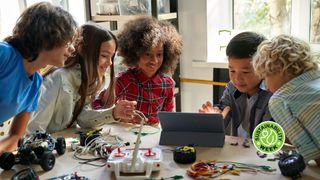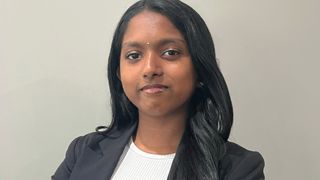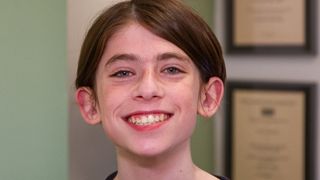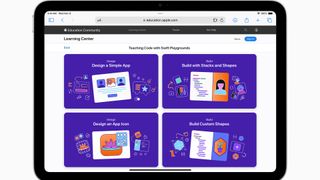I met two incredible teenage Swift coders who might care more about climate change than you
Swift Challengers FTW

With WWDC 2024 drawing near, and Apple's Cupertino campus set to soon play host to thousands of experienced coders, it’s worth considering the next generation of developers who, it turns out, are thinking very much about us and the future of our planet.
"At Apple, we feel like apps for everyone should be made by everyone," Apple VP of developer relations, education, and enterprise Susan Prescott told me before turning over our video call to a pair of very young developers who, with their three-minute app demo projects, won a pair of Swift Student Challenge 2024 awards.
Thirteen-year-old Harshitha Rajesh and 14-year-old Roscoe Rubin-Rottenberg's award-winning apps coincidentally address the same topic: climate change.
Neither app goes very deep, but even just hearing the students' descriptions and seeing the screens they provided to me, I could see they were quite pointed and not at all child's play.

Roscoe told me he'd noticed that the current approach to climate change solutions can be overly simplistic, such as reminding people to eat healthier (or perhaps less processed) food and to "recycle". He sees things differently, and wanted his app to illustrate that point of view.
"Climate change is a very urgent issue and we need big sweeping changes to fix it, and I thought one of the biggest issues is that political compromise is needed to get those big sweeping changes," he said. "So I wanted to make an app to show how hard it is to get real policy passed, and how much compromise you need to make in order to make that progress."
Roscoe's app makes you an administrator in the US Environmental Protection Agency (EPA) with a $10B budget, and then asks you to make policy decisions across a range of climate issues. Fascinatingly, he includes both carbon credits and the level of solution popularity as the tradeoffs you must consider.
Get daily insight, inspiration and deals in your inbox
Get the hottest deals available in your inbox plus news, reviews, opinion, analysis and more from the TechRadar team.

Harshitha's Swift app approaches climate change through the lens of deforestation, and does its best to educate you on the effects of the practice on various trees, but there's also a more sophisticated progression built inside the app.
"There's a short quiz that you can take just to enhance your understanding," explained Harshitha. "If you get a certain score, you get this little prize, which is a little seedling. There are about nine different tasks, which are all related to deforestation, and these are small things that you can do to help reduce these effects." If you complete all the tasks, that seedling will grow into a tree.
Where Roscoe's app looks like it might be at home on the desk of an administration official, Harshitha's is charming, and hides its deep message behind light-hearted visuals.



Since its introduction at the 2014 WWDC, Swift has quickly become a dominant iOS App development platform. A recent study found that 90% of the top 100 apps were programmed in the language. For young students Like Roscoe and Harshitha, their introduction to Swift is often through the iPad-based Swift Playgrounds. I first test-drove the visual programming platform in 2016. Back then, I called the platform an "excellent place to start" for anyone who wanted to learn the basics of coding.
Harshitha chose a different route, originally starting her journey when she was 10 in Python, but soon realized that it was "a little intimidating." Last August, she switched to Swift. "I just thought how it made coding much simpler, and how just with a few lines of code you could develop something that was pretty like amazing," she told me.
Roscoe started coding in Swift Playgrounds in 2019 when he was just nine. He told me it really felt like a game. He meandered into other languages for a time, and then returned to Swift a few months ago to compete in the Student Challenge. "I was so surprised by how much it had changed and improved," he said. "I really kind of fell in love again with the language and how simple and fast it is."



Both apps are, as the Challenge requires, just three-minute experiences. I asked Roscoe and Harshitha if they planned to expand their projects into full-blown apps.
Roscoe, who coded his app on both Mac and iPad, said that while he might put it online as a demo (I hope the EPA sees it), he might also flesh it out more into something like a mini app.
Harshitha, who coded entirely on an iPad, told me she thinks her app would be useful for raising awareness around deforestation and climate change but, like Roscoe's app, it would have to be built out.
When I asked if either student got assistance from their parents, they noted that even though their parents all work in the technology space, none were familiar with Swift (it's like asking your parents to help with New Math).
Harshitha's parents were there to guide her on basic coding concepts, and Roscoe's father was slightly more involved. "He was very interested in what I was doing," said Roscoe, adding that his dad was "super-helpful in making suggestions and helping solve problems."

Harshitha and Roscoe each see themselves having a future in coding. For Roscoe, it seems the community has inspired him, "There are just so many supportive people in the programming community, supportive of beginners and first-time coders, and the open-source community especially is super-helpful and supportive."
As for what they'll code, Roscoe knows he'll expand beyond environmental apps, but also wants to "keep building apps that bring awareness to important issues, especially climate change." Harshitha told me, "It's very important for there to be apps like this that raise awareness for issues like climate change," but she's also ready to expand into other areas, like game development.
Perhaps I'll check in with Roscoe and Harshitha 10 years from now and see where their Swift coding journey led them, but in the here and now, these little demo apps surprised me with their insight and impact. They have something to say, something that matters.
"To see the passion projects that they are," said Apple's Prescott, "why students chose certain projects, why it's important to them, and how coding empowered them to make a difference in the world, to change the world, even a little bit or in some cases a lot… we think that's really powerful."
You might also like

A 38-year industry veteran and award-winning journalist, Lance has covered technology since PCs were the size of suitcases and “on line” meant “waiting.” He’s a former Lifewire Editor-in-Chief, Mashable Editor-in-Chief, and, before that, Editor in Chief of PCMag.com and Senior Vice President of Content for Ziff Davis, Inc. He also wrote a popular, weekly tech column for Medium called The Upgrade.
Lance Ulanoff makes frequent appearances on national, international, and local news programs including Live with Kelly and Ryan, the Today Show, Good Morning America, CNBC, CNN, and the BBC.
Most Popular

